Mold Testing & Remediation Licensing in Texas
Discover the importance of licensing in Texas and certifications for mold testing and remediation in Texas. Learn how proper credentials protect property owners and ensure safe, effective mold management.
4 min read
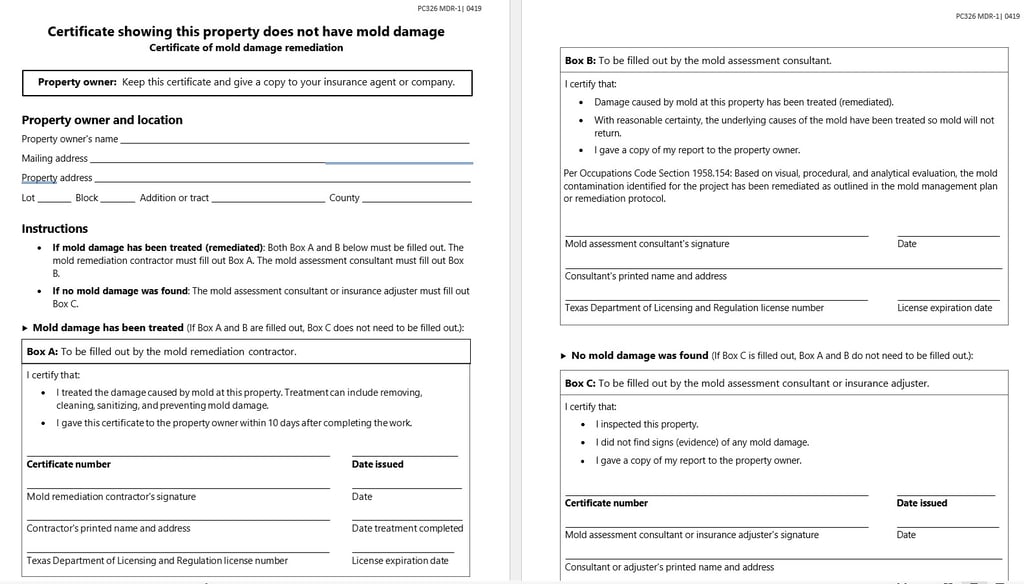

Licensing and Certifications for Mold Testing and Remediation in Texas: Why It Matters for Property Owners in Harris County and Surrounding Areas
Mold issues in homes and commercial properties can cause significant health problems and structural damage. In Texas, including Harris and surrounding counties, the mold industry is regulated to ensure that mold assessments and remediation are carried out safely and effectively. Understanding the licensing and certification requirements for mold professionals is essential for property owners to make informed decisions when dealing with mold issues. This blog explores the different types of licenses required, the importance of hiring certified professionals, and how to verify their credentials.
For property owners in Harris County and surrounding areas, Boone’s Restoration Technologies is a trusted name in mold testing and remediation. With years of experience, they are ready to handle your mold issues with professionalism and expertise. Contact them at 281-444-5959 or visit www.boonesrestoration.com to learn more.
Why Licensing Matters for Mold Professionals in Texas
Licensing and certifications ensure that mold professionals have the proper training, experience, and knowledge to handle mold assessments and remediation safely and in compliance with state regulations. Licensed professionals protect property owners by:
Protecting Consumer Health: Ensuring mold issues are handled according to state health and safety standards.
Maintaining Property Value: Avoiding improper treatments that could worsen mold problems or cause additional property damage.
Providing Legal Protection: Many insurance companies require licensed professionals for mold remediation claims, offering financial protection to property owners.
Types of Mold Licenses in Texas
The Texas Department of Licensing and Regulation (TDLR) oversees mold-related licensing. In Harris County, Montgomery County, and surrounding areas, the key mold-related licenses include:
Mold Assessment Technician (MAT)
Role: Conducts mold assessments, takes samples, and reports findings under the supervision of a licensed Mold Assessment Consultant.
Requirements: Must complete a TDLR-approved training course and pass an exam.Mold Assessment Consultant (MAC)
Role: Develops mold assessment protocols, interprets mold test results, and provides remediation recommendations.
Requirements: Requires advanced training, field experience, and a licensing exam.Mold Remediation Contractor (MRC)
Role: Oversees mold remediation projects, ensuring compliance with protocols and managing the remediation team.
Requirements: Must complete training, demonstrate experience, and pass a TDLR exam.Mold Remediation Worker (MRW)
Role: Carries out physical tasks related to mold remediation under the supervision of a licensed Mold Remediation Contractor.
Requirements: Requires training and registration with the TDLR.
The Importance of a Mold Remediation Protocol
In Texas, a licensed Mold Assessment Consultant must provide a written mold remediation protocol before any work can begin. This protocol outlines the scope of the remediation, safety measures, and the process for handling mold-contaminated materials.
For those in Harris County and surrounding areas, Boone’s Restoration Technologies follows these procedures to ensure that your mold remediation is done according to state standards.
How to Verify Mold Professional Credentials
Before hiring a mold professional in Harris County or Montgomery County, it’s important to verify their credentials. You can check a mold professional’s license status through the TDLR’s online database. Ensure that:
The License is Active: Confirm that their license is current and in good standing.
They Are Properly Insured: Insurance protects against potential damages during remediation.
They Have Relevant Experience: Check that the professional has experience with properties similar to yours or dealing with similar mold issues.
When Licensing is Not Required
Texas law allows property owners to perform mold remediation themselves for areas under 25 contiguous square feet. However, for larger or more complex remediation jobs, hiring a licensed professional ensures safety and compliance with regulations.
What is a Texas Certificate of Mold Damage Remediation (CMDR)?
A Texas Certificate of Mold Damage Remediation (CMDR) is an official document issued by a licensed mold remediation contractor or assessment consultant after mold remediation is completed according to state guidelines. It certifies that the mold issue has been properly addressed and the underlying cause, such as water leaks, has been resolved.
Boone’s Restoration Technologies can help property owners in Harris County and the surrounding areas obtain this important certification once remediation is complete.
Why is a CMDR Important to Property Owners?
Proof of Proper Remediation: The CMDR provides documented proof that mold remediation has been carried out correctly, offering reassurance to current and future property owners.
Protection in Real Estate Transactions: If you’re selling a property, a CMDR demonstrates to buyers that mold issues have been handled safely, preventing potential concerns about mold.
Insurance Benefits: Under Texas law (Texas Insurance Code Chapter 544), having a CMDR can prevent insurance companies from using prior mold claims against your property, ensuring that you don’t face higher premiums or coverage denial.
Health and Safety Assurance: Mold can cause serious health problems, especially for individuals with allergies or respiratory conditions. A CMDR ensures that your property is mold-free and safe.
How to Obtain a CMDR
To obtain a CMDR, property owners must:
Hire Licensed Professionals: Contact a licensed mold consultant and remediation contractor to conduct assessments and complete the remediation process.
Complete Proper Remediation: Ensure that the source of moisture is addressed and that mold is properly removed, in line with Texas Mold Assessment and Remediation Rules (TMARR).
Request a Post-Remediation Assessment: This step ensures that the property meets all safety standards, leading to the issuance of a CMDR.
Conclusion
Hiring licensed and certified mold professionals in Texas is crucial to ensuring safe, effective, and legal mold assessment and remediation. By verifying credentials and understanding the roles of each type of mold professional, property owners can protect their health, property, and investment.
If you're dealing with mold issues in Harris County or Montgomery County, Boone’s Restoration Technologies is here to help. With the right qualifications and a commitment to thorough, compliant remediation, they ensure that your property is safe, mold-free, and protected.
For more information, visit www.boonesrestoration.com or call 281-444-5959 today.
Choosing professionals who meet Texas licensing requirements not only helps eliminate current mold issues but also prevents future problems and liability concerns, giving you peace of mind for years to come.
Expert restoration for water, fire, and mold.
Support
© 2025. Boone's Restoration, Inc. All rights reserved.
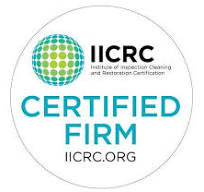

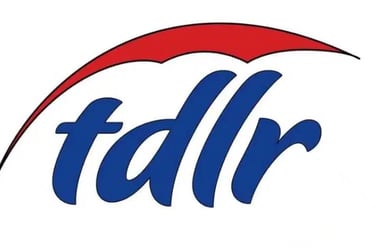

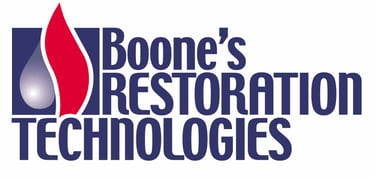

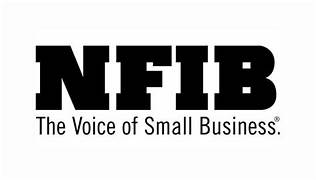

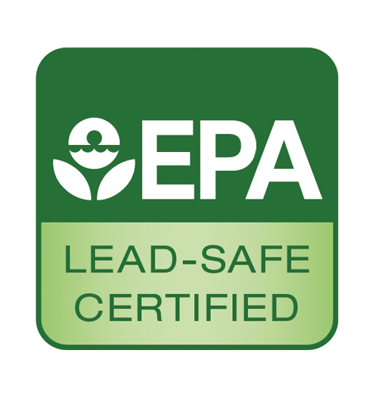





Family Owned & Operated Since 1992
Certified Contractor


